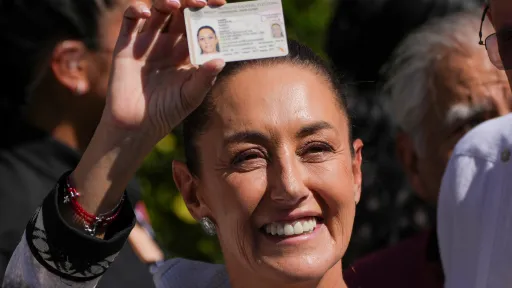
Claudia Sheinbaum has been elected as Mexico's first female president in a historic landslide victory. Sheinbaum, the former mayor of Mexico City and a climate scientist, received between 58.3% and 60.7% of the vote, according to a statistical sample released by electoral authorities. Her victory marks a significant milestone in Mexico's 200-year history, as she becomes the first woman and the first person of Jewish background to lead the predominantly Catholic country.
The election was notable not only for Sheinbaum's groundbreaking win but also for its unprecedented violence. This has been Mexico's bloodiest election in modern history, with 37 candidates assassinated before the vote. Despite the turmoil, the election was largely peaceful on voting day, underscoring Mexico's commitment to democratic processes.
Sheinbaum's main opponents, Xóchitl Gálvez, a tech entrepreneur and former senator, and Jorge Álvarez Máynez, conceded defeat. Gálvez secured between 26.6% and 28.6% of the vote, while Álvarez Máynez garnered between 9.9% and 10.8%. The voter turnout rate was about 60%, consistent with previous elections, with nearly 100 million people registered to vote. In addition to the presidential election, voters were also choosing governors in nine of the country's 32 states, members of both houses of Congress, and thousands of local officials.
The election was seen as a referendum on the administration of outgoing President Andrés Manuel López Obrador (AMLO), whose political movement Sheinbaum is set to continue. AMLO, a populist leader known for expanding social programs but failing to significantly curb cartel violence, expressed his congratulations to Sheinbaum, stating, "She is going to be Mexico’s first woman president in 200 years."
Sheinbaum's campaign focused on maintaining AMLO's policies, including a universal pension for the elderly and youth apprenticeship programs. However, her victory did not elicit the same jubilant public response as AMLO's in 2018, when he won with 53.2% of the vote. While Sheinbaum's supporters were enthusiastic, the crowds celebrating her win were relatively small.
One of Sheinbaum's significant challenges will be addressing Mexico's persistent issues with cartel violence and economic inequality. The country's security strategy has been a major point of contention among voters. AMLO has claimed to reduce historically high homicide levels by 20% since taking office in December 2018, but independent analyses suggest the real decline is closer to 4%.
Voters like Fernando Fernández, a 28-year-old chef, hope Sheinbaum can improve on AMLO's policies, particularly concerning the economy and crime. "You vote for Claudia out of conviction, for AMLO," he said. "But my highest hope is that Sheinbaum can improve what AMLO couldn’t do, like the price of gasoline, crime, and drug trafficking."
The opposition candidate Gálvez had promised a more aggressive approach to organized crime, a stance echoed by many voters dissatisfied with the current administration's handling of security. In her concession speech, Gálvez acknowledged Sheinbaum's victory but emphasized the need for concrete results. "My recognition of Sheinbaum’s victory comes with a firm demand for results and solutions to the country’s serious problems," she stated.
Sheinbaum, who will begin her six-year term on October 1, faces the daunting task of fulfilling these expectations. Her victory signifies the continuation of a political movement, but it also comes with the responsibility to address the deep divisions and challenges within the country. As she takes office, Mexico will be watching closely to see if Sheinbaum can deliver on her promises and lead the nation towards a more secure and prosperous future.











